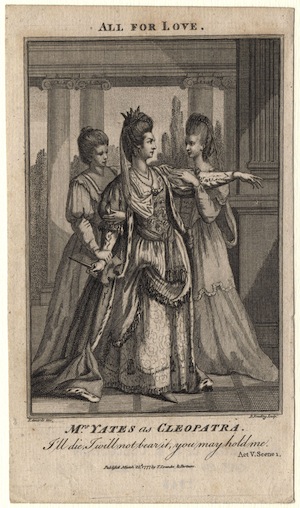I think this is the third time I have read this; I wonder if it probably will be the last. The first time was in October of 2004, and I thought it very good. The second time, a small report of which I made on my other blog in 2009, I thought much less of it, probably because on that occasion I was reading it alongside other Cleopatra plays, Shakespeare especially, but also Shaw and even Samuel Daniel, to which I thought it compared unfavorably. My judgment on this third reading is somewhere in between those of the previous two. The verse struck me once more as admirable and worthy of respect in itself; and as I was not as immersed in the story and particular set of characters over multiple versions as I had been on the second occasion, the manner in which they happened to be depicted here was not as off-putting to me. I am sure that none of these plays/novels/movies written 1500+ years after the events that inspired them are particularly accurate in terms either of history or characterization; however Dryden's characterization struck me as the weakest and least probable of the set when read alongside the others. However as I said, It did not bother me much on this occasion, and indeed I scarcely noticed it.
There is a picture on the page I linked to of my then 5, now 11 year old son holding up my Modern Library copy of Twelve Famous Plays of the Restoration and Eighteenth Century. My other book list loves Restoration drama, so I have read eight of the twelve famous plays for that, and numerous others from the period besides. At least five of the twelve are also on the IWE list and there may be as many as seven--I am not certain off hand whether Goldsmith and Congreve made it or not--so it has proven to be a volume worth having.
I have come over the years to enjoy Restoration plays when it chances that I have to read them, as I have come, I must admit, to enjoy sampling from most of the major genres and periods in literary history. I am not a very fierce reader, particularly with regard to the authors of the past, the value of whose surviving work, at least in the better examples, always seems to me to outweigh their deficiencies. The Restoration was not, I will say, one of the literary eras that I took to right from the start; as a teenager especially, I could make nothing out of it at all. Over a period of years and reading many plays and poems and other books from and about the period I have attained enough familiarity with it that it has acquired an interest for me as something definite and fairly important, and I even have a little fondness for it as a distinct entity in the family, or college, of literary history, people I look forward to seeing at a party every once in a while, especially here at holiday-time. That said, my feeling in reading them is still different from that I have in reading certain other genres to which I am perhaps closer in spirit. Reading long passages of formal verse especially requires some degree of alertness and concentration, and does an admirable job of keeping fuzzier emotions at bay.
I thought this was the only Dryden play to make the IWE list, but I see that The Conquest of Granada has also made it, so we aren't quite done with him yet. Like most modern people, I do not respond to Dryden overly strongly (as you see, I am having difficulty in writing about him)--indeed, it is hard to tell whether anyone has really done so, even in his own time. He was the poet laureate and the leading playwright and public critic and literary man of his age, but even then he doesn't seem to have had a lot of rabid disciples or imitators. He was very good in the technical aspects of writing. His sentences and verses have a kind of neat quality about them as far as being constructions of words and sounds meant to convey thought. Like a lot of writers of his general class, I suppose he ultimately lacks power in the high degree. But to my mind he and his period are still worth knowing in some degree.
The Challenge
I've decided to keep the Challenge as it has been for a little while, take it up if anything interesting should chance to win, and if not, then keep moving along the main list.
1. Jack Campbell--The Last Fleet: Guardian..........................................241
2. Vicki Alvear Shecter--Cleopatra's Moon..............................................56
3. Jacob Abbott--Cleopatra.......................................................................39
H. Rider Haggard--Cleopatra................................................................39
5. Si Sheppard--Actium 31 B.C.: Downfall of Antony and Cleopatra.........6
I don't remember what this time's winner is about--I think it's a modern sci-fi/fantasy type thing, of limited literary interest. My library doesn't even have it. So I will move right on to the next book on the list.



No comments:
Post a Comment